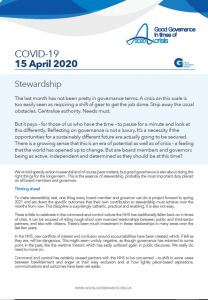Stewardship
15 April 2020

The last month has not been pretty in governance terms. A crisis on this scale is too easily seen as requiring a shift of gear to get the job done. Strip away the usual obstacles. Centralise authority. Needs must.
But it pays – for those of us who have the time – to pause for a minute and look at this differently. Reflecting on governance is not a luxury. It’s a necessity if the opportunities for a sustainably different future are actually going to be secured. There is a growing sense that this is an era of potential as well as of crisis – a feeling that the world has opened up to change. But are board members and governors being as active, independent and determined as they should be at this time?
We’re told speedy action is essential and of course pace matters, but good governance is also about doing the right things for the longer-term. This is the essence of stewardship, probably the most important duty placed on all board members and governors.
Thinking ahead
To make stewardship real, one thing every board member and governor can do is project forward to spring 2021 and set down the specific outcomes that their own contribution to stewardship must achieve over the months from now. This discipline is surprisingly cathartic, practical and enabling. It is also not easy.
There is little to celebrate in the command-and-control culture the NHS has traditionally fallen back on in times of crisis. It can be accused of riding rough-shod over nuanced relationships between public and third-sector partners, and also with citizens. There’s been much investment in these relationships in many areas over the last few years.
In the NHS, new conflicts of interest and confusion around accountabilities have been created, which, if left as they are, will be dangerous. This might seem unduly negative, as though governance has returned to some point in the past, like the wartime rhetoric which has sadly surfaced again in public discourse. We really do need to move on.
Command and control has certainly caused partners with the NHS to be concerned – to shift in some cases between bewilderment and anger at their easy exclusion and at how lightly place-based aspirations, communications and outcomes have been set aside.
There may well be much repair work to do during recovery to re-establish confidence in something local, collective and aspirational. But encouragingly, the better boards and councils and their many partners are already looking beyond the short-term and the negative, recognising the huge scope for creating transformational difference in the new normal.
Robust place-based governance
The starting point for many is the unshakable belief that future sustainability of public services is about the strength and maturity of local, place-based governance. The pausing of much of the boiler-plate structural change in the NHS, which was generally being pushed forward without much local sensitivity or pace, is helpful. It should help to create space for more robust place-based governance, provided the opportunity is taken.
At GGI we are clear that the hallmark of modern governance is that it enables and supports ambition and change. In the new normal this will mean governance that operates confidently beyond normal boundaries – organisational and professional – in the interests of collective stewardship of the public realm.
In the face of the climate created by command and control, making modern governance come alive will require original thinking, an absolute commitment to much more agile approaches to partnership and a shared risk appetite which pushes beyond comfort. Some are ready to do this; others are not.
Think local
These bulletins are designed to provide practical support and stimulus. The main takeaway here for board members is simply to act urgently as individuals, and together with partners in place, to generate local models of stewardship that will guide recovery and become the basis for a credible new normal.
Local matters more than national. The future, given the potential opened up by disruption, could be fabulous for all of us. But it might not be. Whether it is or not will depend largely on how well and quickly enabling, place-based governance is recovered and grown with confidence to match local ambition.
Our weekly virtual meeting with Non-Executive Directors from all over the UK is the source of much deeper insight on the new normal, situational governance and the role of stewardship guiding organisations and local communities forward collaboratively. To join us for the NED seminar this Friday at 10 am or for more information get in touch: events@good-governace.org.uk
If this update prompts any thoughts or questions – or you would like to find out about how GGI can help your organisation during the coronavirus crisis – we would love to hear from you. Please call us on 07732 681120 or email advice@good-governance.org.uk. We will do our best to reply within 24 hours.

